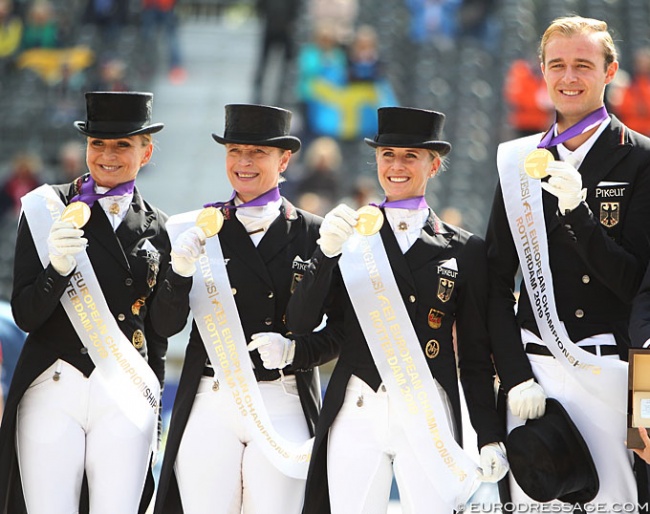
Germany picked up the team gold medal in a dramatic denouement of the team competition that led to Holland getting silver and Sweden bronze at the 2019 European Dressage Championships in Rotterdam, The Netherlands, on Thursday 20 August 2019.
The scenario of this year's nation competition at the Europeans delivered a plot twist with no foreshadowing, leaving the audience gobsmacked with the turn of events. The penultimate rider of the class, Charlotte Dujardin, was eliminated at the tack inspection and her scratched result of 81.7%, reshuffled the podium places. Great Britain dropped from a solid silver spot off the podium to fourth, while home nation Holland all of sudden ended up with an unexpected silver and Sweden with bronze.
Germany's Golden Quartet
German team trainer Monica Theodorescu lined up her gold medal WEG team riders Werth, Rothenberger, Schneider, and Von Bredow-Werndl for Rotterdam with only Schneider switching horses, from Sammy Davis Jr. to her even better 2016 Rio Olympic horse Showtime.
Isabell Werth was unbeatable at the 2018 WEG in Tryon and the judges showed that they like her on Bella Rose the most by placing her first in all three rounds at the 2019 CDIO Aachen. So Werth traveled to Rotterdam as the almost untouchable favourite for the title and in the Grand Prix the 50-year old wielded the axe of power, again!
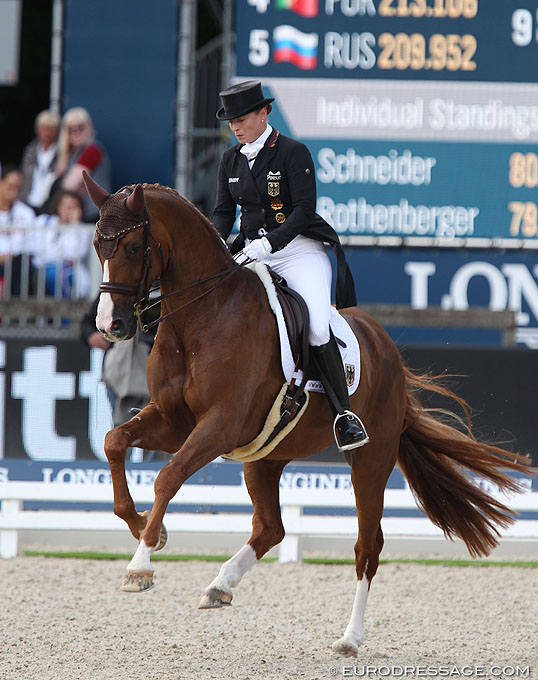
There is no doubt that Werth is one of the best dressage riders in the world and probably the best competition rider. Her magic goes from horse to horse and the judges gladly see through the weaknesses of her horses because of the mastery, expertise and skill which are unparalleled. While Bella Rose's piaffe, passage and the transitions put 10s on the board non-stop, the quality of the mare's piaffe is up for discussion. Is this truly a piaffe or just a passage on the spot? The mare does not lower the haunches and achieve lift in forehand as a piaffe should do. Is that piaffe truly worth a 10? By staying so horizontal in the piaffe a horse can make fluent transitions much more easily. So why even train for a classical piaffe if a flawless rhythm is given precedence and puts 10s on score sheets?
Albeit, Werth and Bella Rose are on point for Rotterdam and their Grand Prix ride was fantastic. The seven judges on the panel - Maknami, Eisenhardt, Foy, Judet, Sanders, Baarup and Halsall - unanimously put the pair first with 85.652%. Their marks ranged from 83.587% to 88.370% !
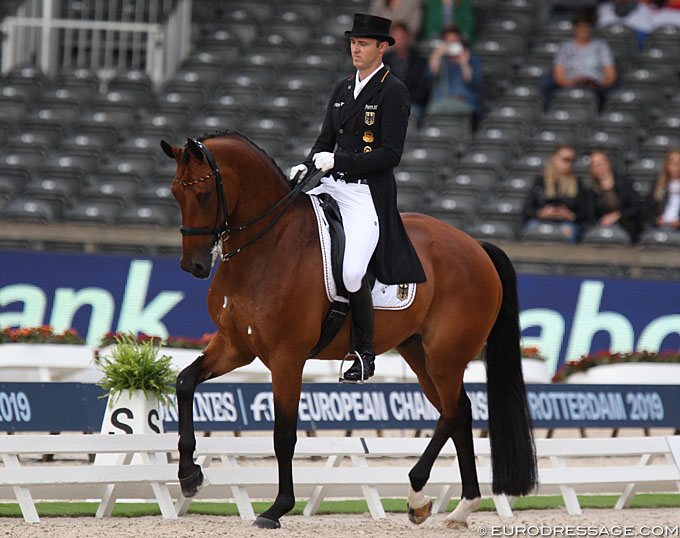
Sönke Rothenberger and the 12-year old Dutch warmblood gelding Cosmo (by Van Gogh x Landjonker) are one of the few pairs this week (alongside Schneider and Dujardin) who could rival with Werth for individual gold). The bay gelding has often proved himself to be in better form and with even higher quality work than Werth but never have they been able to finish the job faultfree with the right level of pezzazz at a major Championship. Will Rotterdam be their moment? Not in the Grand Prix though.
The duo produced a very nice round, but Cosmo did not have that sparkle. In all honesty, Rothenberger didn't need to pull out all the stops for the team competition; a faultfree round sufficed for a high enough score, without sprinkling glitter on top. That sparkle can be saved for the next two rounds. Sönke and Cosmo rode expressive but safe trot extensions, the passage was soft footed the first piaffe was nicely on the spot, but in the second there was a slight tendency to backstep. The walk was mediocre with limited overtrack and a not so clear rhythmical striding through the body. The extended canter was also with the handbrake on, the two tempi changes were ground covering, but the horse swung to the right, the penultimate change in the zig zag was short and in the one tempi changes the horse got behind the vertical. The left pirouette was small, the right one got hairy. The final centerline was lovely. They scores 79.084% to place third with marks going from 77.609% to 80.543%
Germany's dominance is obvious as their scratch score was 76.894% (Jessica von Bredow-Werndl on Dalera, 9th place), a mark many countries beg for to lift dressage sport in their country to a new plane. This is Germany's 24th team gold medal at a Europeans.
Werth has now collected no less than 22 European Championship medals, of which 11 are golden. When asked if it is still special for her, she replied: "It's very special because it is with Bella Rose. In 2011 I was here with Ernie and as everyone knows we had problems with the piaffe. The whole audience was helping me by clucking. This year I needed no help."
Great Britain in Greek Tragedy
The British team suffered the slings of outrageous fortune as their team anchor Charlotte Dujardin got eliminated. Britain was firmly standing in second place and as penultimate rider to go, Dujardin would only have boosted their score total to an even more comfortable second place.
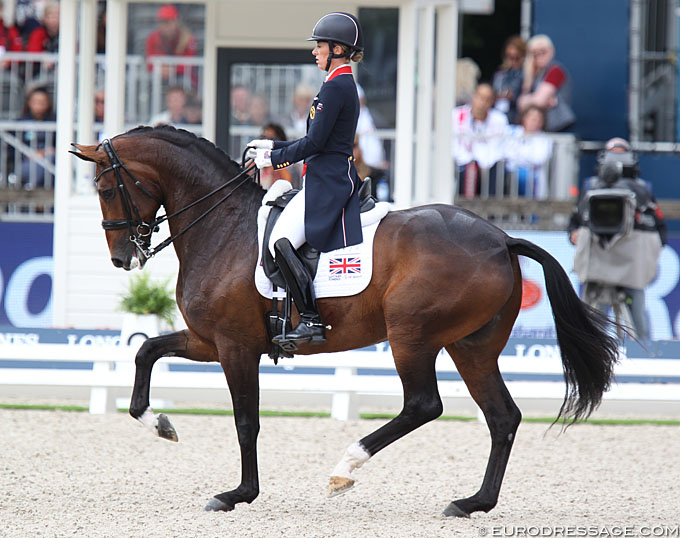
Freestyle has developed much in a year's time and looked so much more mature and strong. They had a nice entry and showed three very expressive trot extensions which no longer appeared hectic in front. The trot half passes are scopey as the mare has much freedom in the shoulder, but in the left one there could be more crossing behind. The passage is spectacular. The mare really moves the hindlegs under the body and has so much airtime and suspension. The first piaffe was hesitant in the rhythm but showed much sit and mare is getting more off the forehand compared to a year ago. The second passage was mega, so big, so off the ground, she's almost giving too much. The two tempi changes were so ground covering that they required the entire diagonal. In the extended canter there was much forward energy, but it also revealed the biggest issue the mare still has and that is that she does not sufficiently stretch in the top line, lengthening her frame and getting the nose out. In the zig zag there was a hiccup in one change, but the one tempi's were lovely. The pirouette left was problematic, it was actually a small volte with no collection nor sit. The right one was much better. In the final passage the mare started swinging in the hindquarters and moved the right hind leg out from under the body although the side view must have been impressive.
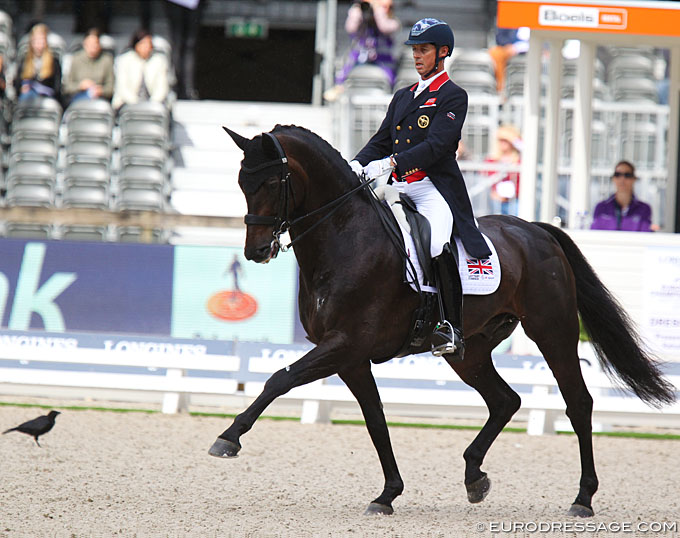
Great Britain's second best score came from Charlotte's mentor Carl Hester with his own, Anne Evens and Ann Corey's 11-year old British Hanoverian Hawtins Delicato (by Diamond Hit x Regazzoni). Delicato was not moved by the two caws that stayed in the arena near the judges box throughout the test. The trot extensions were ground covering, but in the half pass to the right the rhythm became strained. The first passage was off the ground, the first piaffe was early on the marker and a bit timid. The horse struggled with the transition out. The extended walk was good. The second piaffe had good lowering of the hindquarters, but overall the gelding needs to generate more suspension. Delicato was not the happiest in the bridle, opening his mouth and flashing tongue on the left side, even though Carl kept a steady contact with a quiet hand. The canter work was solid with straight two tempi changes, except the last one. The zag zag covered much ground, but could have been more balanced. The extended trot was energetic. The left pirouette was also a tiny volte, while the right one did show the proper collection. They scored 78.323% for a 6th place.
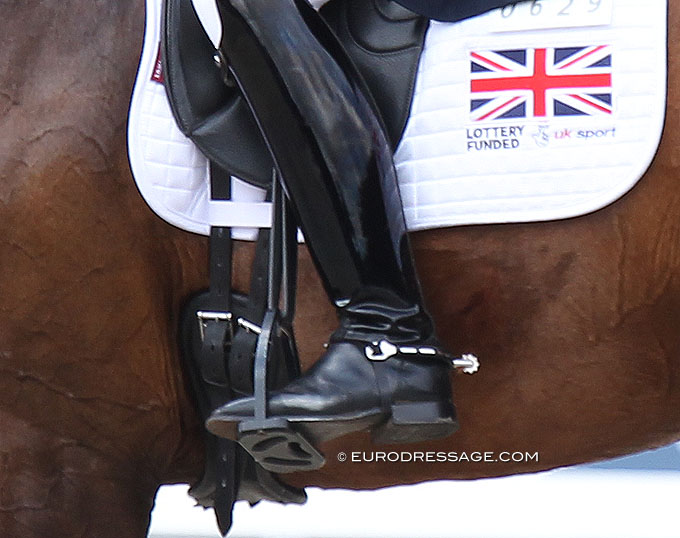
Dujardin's elimination was pure peripeteia as the sudden reversal of the the double Olympian's fortune not only bumped up Holland and Sweden one spot and made Britian drop to fourth place, but it generated an ugly side effect on social media as the hounds had literally smelled blood and took the opportunity to personally attack and devour the rider based on speculation and fantasmagoria. Another reason to pray for a quick death of Facebook, which has made the world smaller and more narrow minded under the pretense of building a global community.
At the press conference there was no British team as they were fourth place-getters, but Isabell Werth commented on the ugly face of social media. "It is always done by a handful of people making a shit storm."
Homeside Heroes Surge to Silver
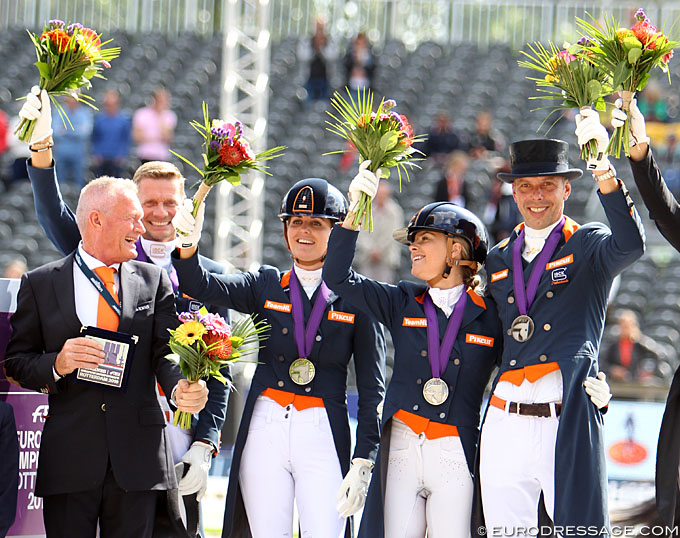
Edward Gal, Emmelie Scholtens, Anne Meulendijks; Hans Peter
Minderhoud
Edward Gal was again the key rider for the team championship. It is rare occasion to see Edward compete abroad lately and this year he only rode Gaston Glock's 11-year old Danish licensed stallion Zonik (by Zack x Romanov) in one international. He took him out in Geesteren, a stone's throw from his home yard, and swept the board there.
In Rotterdam, Gal had Zonik looking very powerful like a body builder: masculine, muscled. The trot extensions were strong and ground covering, the collected trot was more a passage. The half passes were fluent, but the halt for rein back not square. The first passage was bouncy and regular, but the horse three times piaffed the same: high hocks out from under the body, on the forehand, but with an ok rhythm. The second trot extension and transition into passage was very nice. The extended walk could have had more overstep. There were a few uneven steps in the second passage and the canter strike off was very early before the marker.
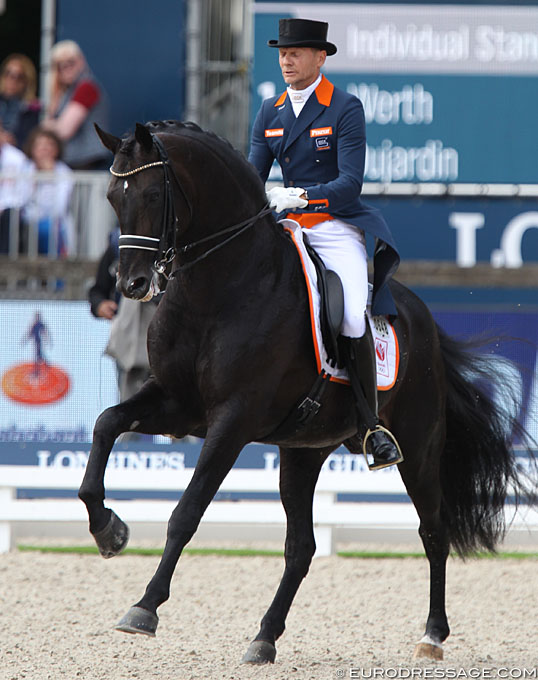
Holland's second best score came from Emmelie Scholtens on Ad Valk's 11-year old KWPN stallion Desperado (by Vivaldi x Havidoff). The black produced engaged trot extensions and big half passes although there could have been more parallelism in the left one. The horse tilted to the left at the beginning of the test and also showed his tongue, not really chewing the bit and foaming. The rein back was good. The second trot extension could have been purer in the rhythm. In the first piaffe the horse dragged a bit with the right hind. The passage was expressive. In canter, Desperado executed a powerful extended canter, but the green Grand Prix horse struggled a bit with the balance in the other canter work. The zig zag was ground covering but the hindquarters swayed to the right, the two tempi changes were big but not straight. The ones were really good. The pirouettes were nice but in the exit of the right one there was a double beat. Desperado still had plenty of energy in the final centerline, but it was an effort as indicated by the swooshing tail. They scored 76.087% (range 73.152 - 77.065%) to finished 13th.
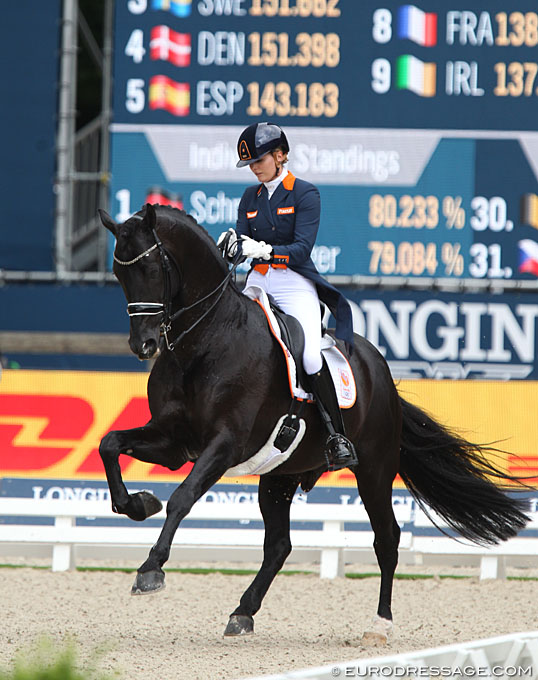
At the press conference, the Dutch were full of good humour. "All the mares in the competition were warming up at the same time as I," Edward Gal joked about having a very stalliony Zonik to ride today. "I was thinking, I hope his balls fall off. In the ring I felt his concentration was a little bit gone." Emmelie Scholtens was also thrilled to be on the podium. "I've been riding Desperado since he was three. He's always been my big friend. I love him and I hope he loves me too." Hans Peter Minderhoud shared on the roller coaster of the day. "This afternoon was crazy. We were counting all the time. It's been four years since we had a medal. It's not fun to travel to Rio and Tryon and not to have a medal in your suitcase." Team rookie Anne Meulendijks added, "I'm happy to be on such a strong team. My test was not my best but I'm happy I have a medal in my suitcase."
Sweden Thrilled with Bronze
The Swedish team, consisting of Therese Nilshagen and Patrik Kittel with his two students, sisters Juliette and Antonia Ramel, ended up with bronze were ecstatic to be on the podium.
"It was crazy in the stables. Juliette and I had stupid mistakes. We were really angry about it," said Nilshagen, "but daddy Patrik did a good job."
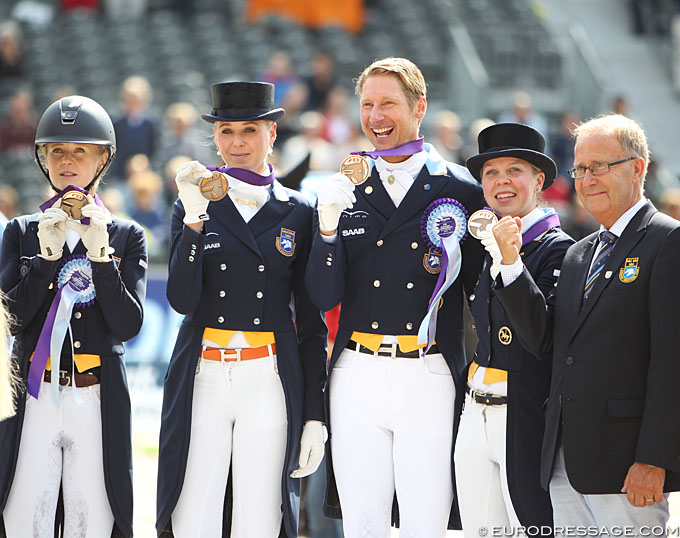
Patrik Kittel, Therese Nilshagen and team captain Bo Jena
Juliette Ramel and her 13-year old Dutch warmblood gelding Buriel KH (by Osmium x Krack C) finished 12th with 76.196, but her marks went from 74.457% to 80.435%. The bay is built naturally uphill with a high set neck so he easily has that beautiful uphill silhouette. The first trot extension was a bit hurried and the bending in the half pass right could have been better, but the horse moved in an even ground covering rhythm. The first piaffe-passage was lovely. The extended walk was not shown, with no instep at all (score 6.1?), but the second piaffe-passage was wonderful with flowing transitions. The two tempi changes were big, the extended canter uphill but there was no lengthening of the frame. There was a blip at the start of the zig zag and a mistake in the one tempi changes. The pirouettes were great.
Nilshagen followed in 14th place with 75.466%, while Antonia Ramel had a scratch score of no less than 74.224%.
Denmark Goes Tokyo
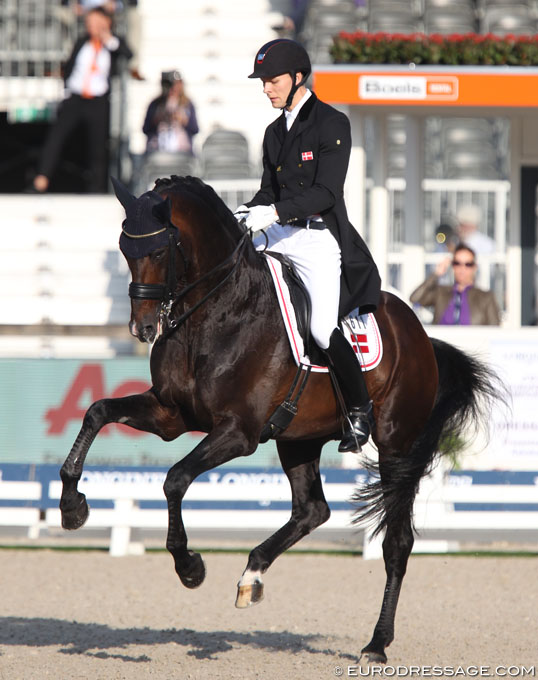
Bachmann Andersen and the Kjeld Kirk Kristiansen's 15-year old Dutch warmblood stallion Blue Hors Zack (by Rousseau x Jazz) rode a personal best score of 78.665% and placed fifth. The dark bay still looks at his best, more powerful, more carrying and well muscled. The trot extensions were big, the half passes smooth, the passage regular, springy, and quick off the ground. The first and second piaffe were too forward. Although the canter strike off was sloppy, the horse really grew into the test and got better in the canter tour. With all this increased power and expression unfortunately a much stronger contact came. The rider was restless with his hands and therefore the horse gaped with his mouth often wide open. The two tempi changes were straight, the ones absolutely fabulous. The pirouettes were small. Zack still had plenty of energy on the final centerline.
While Bachmann and Zack are all power and expression, Cathrine Dufour and her 16-year old Danish bred Atterupgaards Cassidy (by Caprimond x Donnerhall) were all softness, accuracy and harmony. The pair unfortunately had to ride in a massive downpour of rain, but they looked unphazed by the elements.
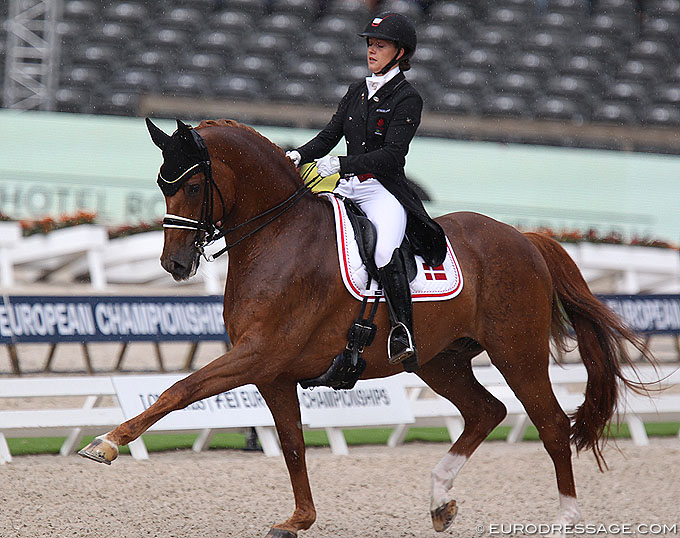
With a 78.665 from Daniel Bachman Anderson and Zack, Denmark guaranteed a Tokyo place even if Cathrine Dufour did not take part today. Denmark's third team score was achieved on Monday by Anders Dahl on his wife Fiona Bigwood's Fidelio van het Bloemenhof (72.733%). Agnete Kirk Thinggaard's 72.671% was the drop score.
Ireland and Portugal Say Konichiwa
Aside from the team medals, another exciting competition was decided through the Grand Prix in Rotterdam. Three team tickets for the 2020 Olympic Games in Tokyo were up for grabs. Denmark was a clear favourite for the first one and there was no surprised that they snatched it, but a monumental battle took place for the last two. Portugal and Ireland grabbed them.
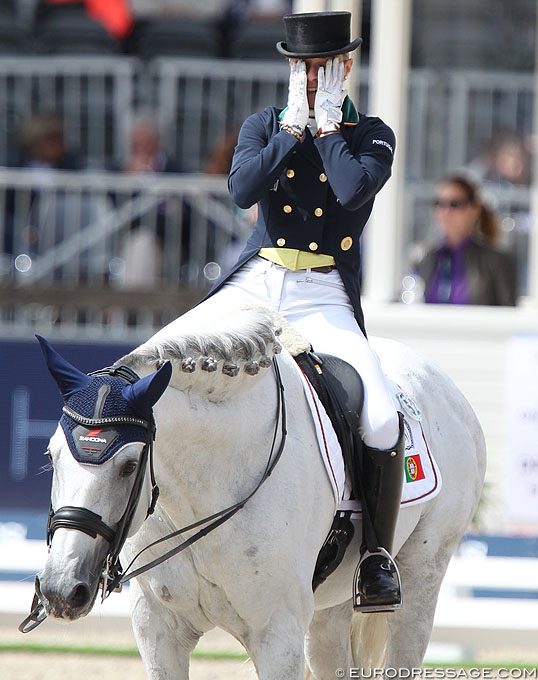
The competition at the 2019 European Dressage Championships continues on Thursday afternoon 16h00 with the Grand Prix Special.
Text and Photos © Astrid Appels - NO REPRODUCTION ALLOWED
Eurodressage was on the scene photographing all dressage riders in Rotterdam. If you are interested in photos for print or social media, send us an email.
Related Link
Eurodressage coverage of the 2019 European Dressage Championships